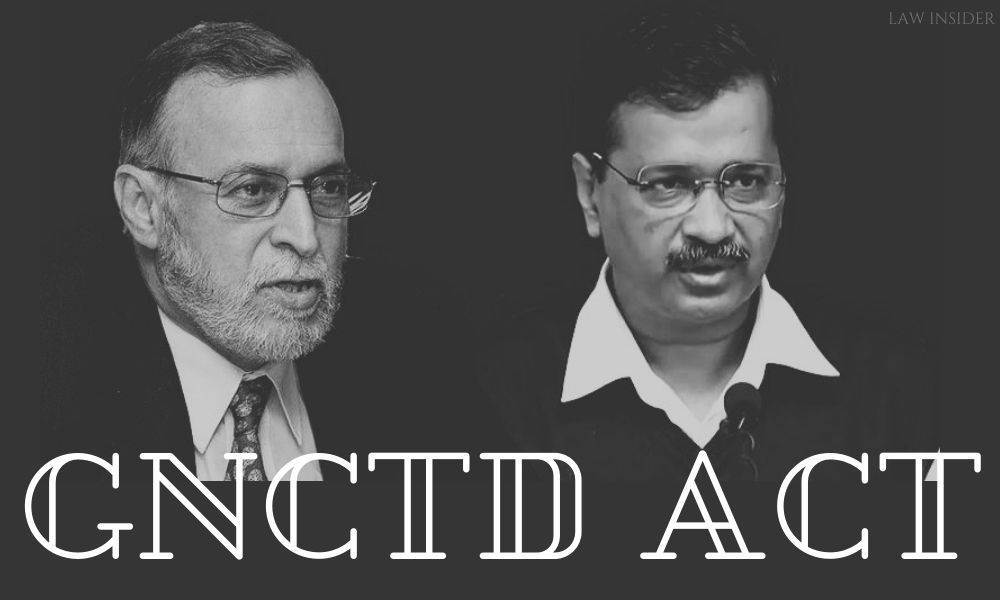By Dhruva Vig
On March 28, 2021, the Government of National Capital Territory of Delhi (Amendment) Act, 2021 received President Ram Nath Kovind’s assent for the purposes of amending the ‘Government of National Capital Territory of Delhi Act, 1991.’
This act mainly seeks to enhance the powers of the Delhi Lieutenant Governor (Anil Baijal) over the elected government of the GNCTD, by declaring him to be the “Government of Delhi“. It also provides that the opinion of the LG “shall be obtained” on all such matters as may be specified by the LG, before taking any executive action on decisions of the Council of Ministers of the Delhi Government.
The bill was initially passed on March 24, amid a walkout session by the opposition in the Rajya Sabha. According to news reports, the President was admitted to the AIIMS hospital in Delhi after complaining of sudden chest pain and has undergone a successful bye-pass surgery since then on March 30.
The Amendment Act of 2021 has brought in the following modifications to the old act:
- Under Section 21 of the principal Act, the expression “Government” has been defined. The expression “Government” referred to in any law, is to be made by the Legislative Assembly shall mean the Lieutenant Governor (LG) from here on forth.
- Under Section 33 of the principal Act, in sub-section (1),—(a) After the words “conduct of its business”, the words “which shall not be inconsistent with the Rules of Procedure and Conduct of Business in House of the People” shall be inserted. This means that that the Rules made by the Delhi Legislative Assembly to regulate the procedure and conduct of business in the Assembly must be consistent with the Rules of Procedure and Conduct of Business in the Lok Sabha.
(b) In the proviso, for the words “Provided that”, the following shall be substituted under the new Act, namely:—
“Provided that the Legislative Assembly shall not make any rule to enable itself or its Committees to consider the matters of day-to-day administration of the Capital or conduct inquiries in relation to the administrative decisions, and any of the rule made in contravention of this proviso, before the commencement of the Government of National Capital Territory of Delhi (Amendment) Act, 2021, shall be void:” This means that the Act now prohibits the Legislative Assembly from making any rule to enable itself or its Committees to: (i) consider the matters of day-to-day administration of the NCT of Delhi and (ii) conduct any inquiry in relation to administrative decisions. Further, any provision in force having the above said effect will be void. - In section 44 of the principal Act, in sub-section (2), the following proviso shall be inserted, namely:—
“Provided that before taking any executive action in pursuance of the decision of the Council of Ministers or a Minister, to exercise powers of Government, State Government, Appropriate Government, Lieutenant Governor, Administrator or Chief Commissioner, as the case may be, under any law in force in the Capital, the opinion of Lieutenant Governor in term of proviso to clause (4) of article 239AA of the Constitution shall be obtained on all such matters as may be specified, by a general or special order, by Lieutenant Governor.” This means that under the provisions of the Act, the opinion of the LG must be obtained before taking any executive action on decisions of Delhi Government, on such matters as may be specified by the LG.
The Supreme Court’s judgement of 2019 in the case of GNCT of Delhi v. Union of India & Anr. (commonly known as Delhi v. LG case).
The Constitution Bench comprising of then CJI Dipak Misra, Justices AK Sikri, AM Khanwilkar, DY Chandrachud and Ashok Bhushan had ruled that, “LG is an administrative head in the limited sense, and is not a Governor. He is bound by the aid and advise of NCT Government in areas other than those exempted“.
The Court also gave the view that the real purpose behind the Constitution (69th Amendment) Act, 1991, which inserted Section 239AA (Special provisions with respect to Delhi) and paved way for setting up an elected Government in the Union Territory was “to establish a democratic setup and representative form of government wherein the majority has a right to embody their opinion in laws and policies pertaining to the NCT of Delhi subject to the limitations imposed by the Constitution.”
The Constitution bench also expressed the view that “the exercise of establishing a democratic and representative form of government for NCT of Delhi by insertion of Articles 239AA and 239AB would turn futile if the Government of Delhi that enjoys the confidence of the people of Delhi is not able to usher in policies and laws over which the Delhi Legislative Assembly has power to legislate for the NCT of Delhi“.
The Amendment Act of 2021 appears to be in direct contravention with rulings of the Court on many grounds, and hence, might be a subject of judicial review in the near future.
References:
President Gives Assent To GNCTD Amendment Bill Enhancing Powers Of Delhi Lieutenant Governor
Centre’s Delhi Amendment Bill is at Odds With Supreme Court’s Ruling and the Constitution
Govt. Of Nct Of Delhi vs Union Of India

